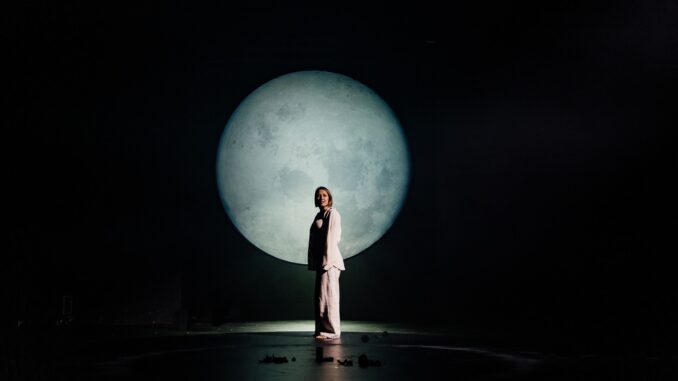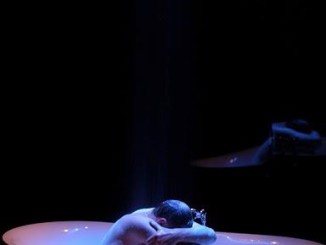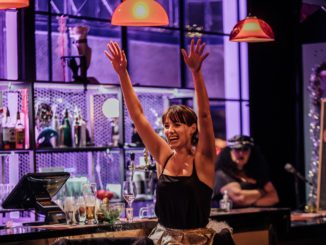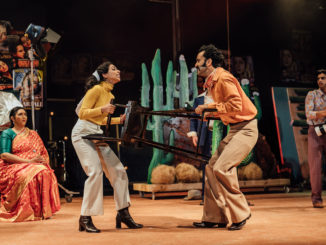
[Questioning Reality]
The Writer by Ella Hickson is a play full of provocation. It asks questions it cannot answer. It challenges the dominant modes of theatre (and society) while still existing within them. What are we to take away from that?
The back side of some set pieces sit on the stage. We can see right into the wings, where more set pieces sit, alongside tables of props. Immediately we are plunged into the world of construction and artifice. This play wants to draw attention to the fact that it is a play. A young woman (Ash Williams) enters and gazes despondently out at the audience. She has an impassioned argument with a male director (Matt Whelan) about the play she just saw – how it was soulless and male gaze-y, and the theatre is a space for the privileged to indulge laughing at themselves for an hour or two before they go right back to their normal lives. It is a blazing scene which manifests dominant capitalist and patriarchal power structures, and raises the question of whether theatre can ever truly ‘change the shape of the world’.
Then the rug is pulled out from under us. This scene was not ‘real’, but rather a performance by two actors of a work in progress by The Writer (Sophie Henderson). She sits on stage with the actors and The Director (Stephen Lovatt) for a Q&A session, during which the power dynamics between Writer and Director seem to mirror those played out by the two actors – an older man who supports (and perhaps desires) the younger woman, but thinks he knows best about how things should be.
Ideas of power and control run throughout the show, as it undulates back and forth between ‘scripted performance’ and ‘reality’, taking us on a wild and strange journey. The Writer herself is an elusive character, glimpsed through her monologues of existential dread and her constructed fantasies. Despite their strained relationship, The Director is the only one who anchors her to reality. They exist together in the ‘real’ space, and he gazes at her from the side of the stage while the set deconstructs around her. Or does he control her? Does he tie her to a version of reality that she wants to throw off? He wants her to write traditionally dramatic dialectics, while she wants to subvert theatrical modes and explore her honest, artistic self, as is enacted in the middle sequence – a fantasy and sanctuary of the divine feminine, a liberating queer love, sex that is connected and intimate and sacred.
By contrast, the dialectics she performs are bound by oppressive power structures. The Writer argues with her wet-blanket boyfriend about taking a job she doesn’t want for the money, and lies limp on the sofa while he fucks her. But when the scene is between two women, these dynamics are almost reversed. Gone is queer liberation and sacred intimacy. Instead, the young black woman is heavily sexualised (in hot-pants) while The Writer seems drawn to play the male, patriarchal role – enacting the male gaze on her partner, terrified of being fucked but more than happy to be the one wielding the phallus, pleasuring only herself in a disconnected and essentially violating act.
These scenes show how traditional modes of theatre might serve only to reinforce the dominant culture of society, as well as reflecting the relentless suffocation of that society back to us. But they also point to a sense of hopelessness, of inevitability. The Writer doesn’t really seem to be in control of what happens on the stage. The set is moved and changed by a team of people who appear from seemingly nowhere. A baby is brought on for…some reason… and she laments that it’s not real, it’s not her baby. She can only stare, helplessly, at the director (the watchful eye of god) while others shape the world around her. No, we do not have control over our lives, this seems to say. We are powerlessly situated, bound to a society of oppressive structures with rich, old, white men sitting on the side of the stage pulling the strings. Even when we shirk heterosexual relationships, we cannot fully shirk heteronormative power dynamics, it seems it say. And so the oppressed becomes the oppressor, and on and on it goes.
The Writer is a play constantly wrestling with itself. It wants to be radical, eschewing tradition in its critique of power structures and privilege. Yet it fails by its very nature. As is pointed out during the Q&A scene, race is never explicitly dealt with despite Actor 1 being a black woman. The Writer (a white woman) is hesitant to touch the subject. Indeed, that is the only time race is mentioned in the play. It is present, through the casting of Ash Williams, but is it enough to have a black body on stage when race is not directly addressed in the text? And, of course, the play itself is a piece of commerce. Silo Theatre needs to recoup its spending, and Q Theatre is a place only for those who can afford a ticket. This contradiction asks us if art and commerce can ever be separated and, if not, can art ever be truly revolutionary?
The Writer is an interesting choice for Silo, a company known for programming challenging and subversive works (their most recent being Seven Methods of Killing Kylie Jenner). On the one hand, Silo wants to use art to provoke thought about society, perhaps even to change society. On the other, it is bound by the capitalist system and traditional pay structures. Indeed, this is not just ‘The Writer’ but ‘The Milford Asset Management Season of The Writer.’ Being in the Q foyer on opening night only heightened this experience for me. There I was drinking my free glass of wine and milling among industry big-wigs – all of us returned so easily to the comforts of our (privileged) everyday lives.
So, what does it mean to make truly challenging, radical art? Does the play itself know? It seems to be about power and art, but what is it really saying? There are palpably relatable MeToo-type experiences in the dialogue between men and women. Yet the nature of the relationship between Writer and Director is unclear. Although he’s in control in some ways (holding the purse strings), he keeps a physical distance from The Writer, stepping away when she moves closer. This play (or, at least, Silo’s version of it) seems to eschew easy categorisation and provides no answers to the many questions it raises.
This might all seem confusing and high-falutin, and indeed the play is that. But it is also incredibly funny, and here it is expertly performed and exquisitely designed. Director Sophie Roberts has subtly shifted Ella Hickson’s UK script to an NZ context while managing to make it all feel placeless and timeless; almost dreamlike. Rachel Marlow’s lighting is gorgeous. Paloma Schneideman’s sound design adds layers of absurdity, while Daniel Williams’ set feels realistic and surreal at the same time. It is all impeccable. The Writer is a dynamic, provocative, contradictory piece that asks us to probe deeper into the layers of constructed reality. In its failure to be truly radical, it points to the systems and patterns of thought that prevent us from enacting meaningful change. It is paradoxical, playing with ideas of control, power, art and meaning, but never settling on a conclusion, leaving us in chilling darkness. Perhaps that’s the best that theatre (at least, in its current form) can give us. The opportunity to ask questions.
The Writer plays Q Rangatira 1-18th September, 2022.




Leave a Reply